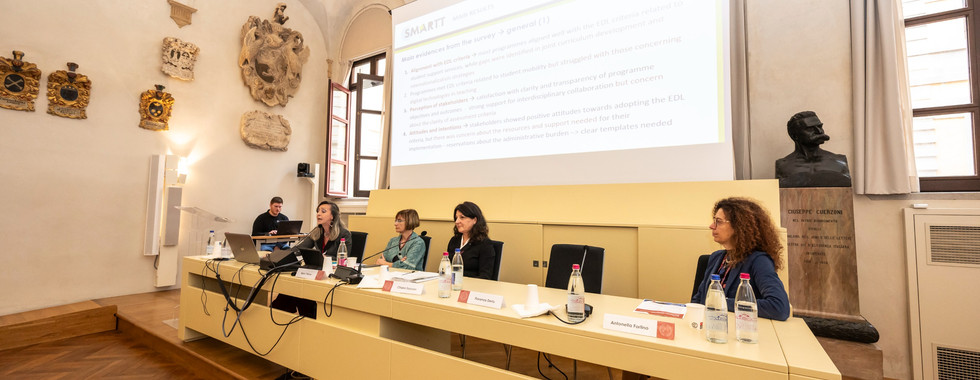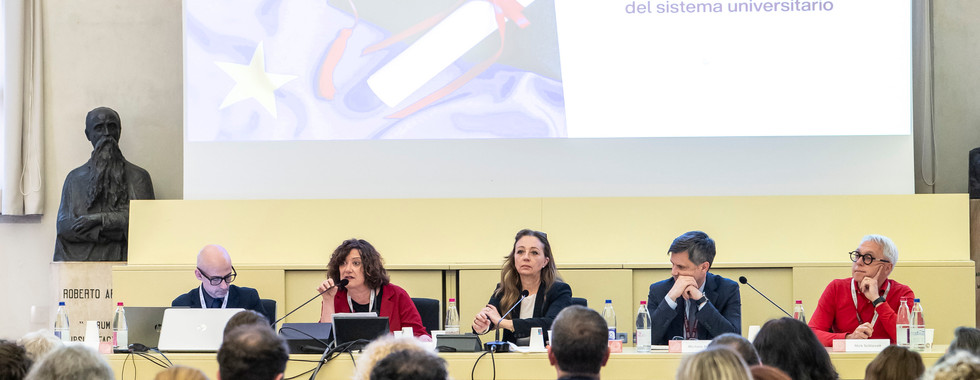Padua hosts the national conference on “European Degrees: toward a full internationalisation of the higher education system”
- Apr 19, 2024
- 2 min read
Updated: Apr 22, 2024
On April 10th the University of Padua hosted the conference "European Degrees: toward a full internationalisation of the higher education system." The purpouse of the event was to reflect on the potential of European Degrees with a focus on the global internationalisation of Italian universities. Representatives from the European Commission, the Ministry of Higher Education and Research, the National Agency for the Evaluation of the University System and Research, as well as various Italian and European universities, contributed to the discussion.
The theme of the conference was more relevant than ever: on March 27th, the European Commission presented a new package of proposals to promote transnational cooperation for undergraduate courses and international students mobility, the so-called 'Blueprint for a European Degree.' The initiative represents a significant step towards a European Degree, a qualification awarded by multiple European universities and automatically recognized throughout the Union. Essential for the awarding of the European Degree will be the compliance with a series of criteria that joint programmes must meet, such as: excellence in education; joint course management; student mobility; interdisciplinary and employability; adherence to European values.
This important achievement has been actively contributed to by six pilot projects (involving over 140 institutions) which, in the last 12 months, have analyzed the criteria for issuing the Joint European Degree Label, tested its effectiveness and potential attractiveness. Moreover, thanks to numerous consultations with university professors, staff, and students, companies, ministries, and quality assurance agencies, the projects have developed a series of recommendations for overcoming regulatory obstacles related to joint programs. Together with EDLab, two other projects, SMARTT, and ED-AFFICHE, presented their results during the conference at the University of Padua.
"We are honored to see how the European Commission has embraced the proposals and recommendations of the EDLab project within the framework of the new Blueprint for a European Degree,"
commented Professor Thiene, Rector's Delegate for Joint Degrees and International Rankings at the University of Padua.
"The criteria proposed for the European Degree are the result of the constructive dialogue we have had over these months with the Commission, and the new formulation of the criteria broadly reflects the work carried out by EDLab. At the same time, the Label proposed and issued by the EDLab project will be useful in the future negotiation phases of the so-called European Degree."
"I am extremely satisfied with the role of the University of Padua in this process,"
commented the Rector Prof. Daniela Mapelli
"For years, our University has been at the forefront of developing international joint programmes and double degrees with a growing interest in these types of degrees, with 43 active programmes in 2023/24, and 11 Erasmus Mundus Joint Masters. Our participation in the Arqus Alliance will also allow us to start a new joint master's degree in International Cybersecurity and Cyber Intelligence in 2024/25. Being involved in international networks and initiatives is crucial for the growth, innovation, and internationalization of our University. We hope that the excellent dialogue initiated with the Ministry of Higher Education and Research, the National Agency for the Evaluation of the University System and Research, and the other Italian universities involved in these projects will continue in the future and serve as an engine for the full internationalization of the Italian higher education system."





























































